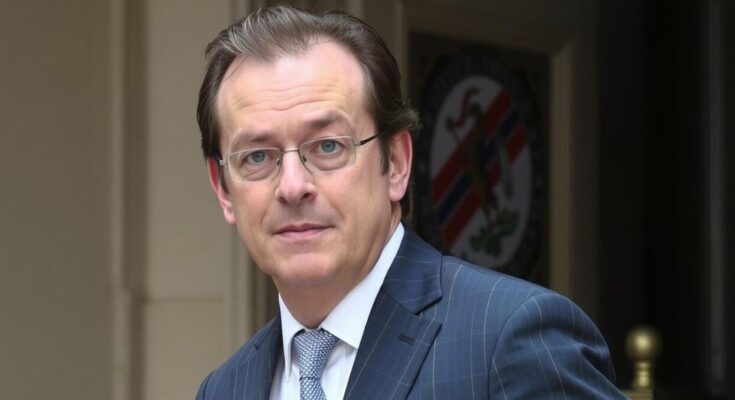Nicolas Sarkozy is on trial for allegedly receiving illegal funds from Libya’s Gaddafi to finance his 2007 election campaign. Facing multiple accusations alongside twelve others, Sarkozy denies all charges, claiming political motives behind them. The trial could result in a ten-year prison sentence and highlights critical issues of corruption within French politics.
Former French President Nicolas Sarkozy is currently undergoing trial in Paris, facing grave accusations of receiving illicit funds from the late Libyan leader, Colonel Muammar Gaddafi, to support his 2007 presidential campaign. Prosecutors assert that in return for such financial assistance, Sarkozy assured Gaddafi of his aid in improving Libya’s tarnished image among Western nations. Sarkozy, who held the presidency from 2007 until 2012, has consistently denied these claims, alleging that they are motivated by those seeking to undermine him politically.
The origins of this investigation trace back to 2013, instigated by allegations from Saif al-Islam, Gaddafi’s son, regarding substantial monetary support for Sarkozy’s campaign. Subsequently, Lebanese businessman Ziad Takieddine revealed that he possessed documented evidence indicating that Sarkozy’s election bid received “abundant” funding from Tripoli, suggesting that payments of €50 million continued even after Sarkozy assumed the presidency. Alongside Sarkozy, twelve others, implicated in orchestrating the alleged agreement with Gaddafi, are also facing trial, all of whom deny the charges.
Additionally, Carla Bruni-Sarkozy, Sarkozy’s wife and a renowned former model and singer, was charged last year for allegedly concealing evidence related to the Gaddafi affair and conspiring to commit fraud, charges she also denies. Since his defeat in the 2012 presidential election, Sarkozy has encountered numerous criminal investigations, including a recent ruling where he was found guilty of overspending in his 2012 campaign and subsequently attempting to conceal this fact. He was sentenced to a year in prison, of which six months were suspended, and notably became the first former French president to receive a custodial sentence for corruption-related offenses.
Currently, Sarkozy is not wearing an electronic monitoring tag, although it is anticipated that he will don one during the trial, which is scheduled to last three months and conclude on 10 April. Should he be found guilty, he faces a potential sentence of up to ten years in prison, marking a significant moment in the history of French politics and the consequences faced by its former leaders.
The trial of Nicolas Sarkozy highlights allegations of corruption and illegal campaign financing, shedding light on the intricacies of political financing at high levels of government. The case revolves around claims of illicit funds from Libya that were allegedly used to secure Sarkozy’s election victory in 2007. This controversy underscores broader issues concerning the intersection of politics and finances, particularly in relation to former leaders’ accountability for their actions while in office. Legal inquiries surrounding campaign funding have surfaced repeatedly in France, suggesting a pattern that has implications for future elections and governance.
In conclusion, the trial of Nicolas Sarkozy is a critical examination of alleged corruption at the highest echelons of French politics, centering on accusations of illicit financing from Libya during his 2007 campaign. As the legal proceedings unfold, they may set significant precedents for political accountability among former leaders in France. The potential ramifications of this trial extend beyond Sarkozy, potentially influencing the integrity of electoral processes and the conduct of politicians in the future.
Original Source: www.bbc.com




